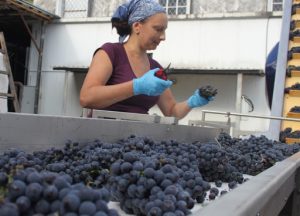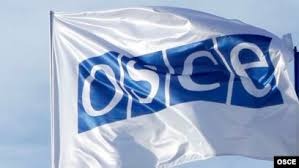
The Synevo laboratory, part of the Swedish holding Medicover, has launched PCR tests that detect British and South African coronavirus (COVID-19) strains, including their currently known mutations.
According to Synevo’s press release, new PCR tests are carried out on new generation equipment and reagents from the U.S. company Abbott.
Investments in equipment for testing (two analyzers) amounted to more than EUR 200,000.
The tests detect the virus at the earliest stages of the disease, when the virus cells are still very little in the body, while other test systems will still give false negative results, although the person is already sick.
According to Synevo Development Director Mykola Butenko, new PCR tests allow detecting British and South African COVID-19 strains with the same accuracy as the previous COVID-19 strains.
In addition, new PCR tests, in addition to detecting COVID-19, can determine the viral load of SARS-CoV-2 on the body and the likely stage of the disease.
“We have received official confirmation from the head office of Abbott in the United States that new PCR tests detect two new strains of coronavirus: British and South African. These results were obtained by Abbott in clinical trials, and the reagents have already received international FDA accreditation,” Butenko said in a press release.
Synevo said that Abbott’s PCR tests are one of the most reliable in the world, their sensitivity is only 100 copies per 1 ml of biomaterial, while the sensitivity of other PCR tests for COVID-19 available on the Ukrainian market, from 400 copies and higher. This sensitivity allows almost completely eliminate false negative results.
Synevo is Ukraine’s largest network of medical laboratories, a division of the Swedish medical holding Medicover. The Synevo network consists of more than 300 laboratory centers operating in more than 115 cities throughout Ukraine, as well as seven laboratories in which more than 1,500 types of tests are performed.

Grape processing in Ukraine in 2020 decreased by 38.8% compared to 2019, to 75,980 tonnes, according to the State Statistics Service.
According to its data, of the total number of grapes processed into winemaking materials, the enterprises directly grew 27.4%, or 20,800 tonnes, and the rest of the raw materials were purchased from households.
In Odesa region in 2020, some 56,400 tonnes of grapes were processed and in Mykolaiv region 15,400 tonnes, which is less than in 2019 by 32.4% and 26.7% respectively.
The main varieties of processed grapes remain Cabernet Sauvignon with 13% (less by 23.5% compared to 2019), Muscat with 10.4% (less by 5.4%), Chardonnay with 9.9% (less by 33.6%) and Aligote with 9.5% (less by 48.7%).
The service said that the production of winemaking materials in 2020 decreased by 41.2% compared to 2019, to 5.68 million decaliters. At the same time, the production of table wine decreased by 42.5%, to 3.58 million decaliters, champagne and sparkling wines by 28.2%, to 1.36 million decaliters, and the production of cognac fell by about 90.5%, to 230,000 decaliters.
The decline in grape processing was reported to be mainly caused by adverse weather conditions. Grape growers in Odesa region complained about the dry winter and spring of 2020 with insufficient rainfall.
According to the State Customs Service, exports of Ukrainian wine and grape must in 2020 increased in quantity terms by 88.7%, to 16,620 tonnes, and in monetary terms by 9.6% to $13.08 million.
At the same time, the export volumes were significantly lower than imports, which last year increased by 15.6% in quantity terms, to 64,430 tonnes, and in monetary terms by 22.1%, to $179.23 million.
Exports of vermouth and other grape wine in 2020 amounted to 460 tonnes for $1.09 million (less by 23.7% and 34.8% respectively), while their imports to 3,790 tonnes for $8.09 million (an increase in quantity terms by 1.4% and a decrease in monetary terms by 12.6%).

The conflict in Donbas is not and cannot turn into a frozen one, OSCE Chairperson-in-Office, Swedish Foreign Minister Ann Linde has said.
“I am categorically opposed to calling the conflict in Donbas or Crimea frozen […] As this will mean that you have surrendered and do not consider it possible to resolve it. And I believe that Donbas is definitely not frozen now. After all, the Trilateral Contact Group or the Normandy format is still in operation, trying to find a solution,” Linde said in an interview with Yevropeiska Pravda (European Truth) published on Wednesday.
She said that at the Normandy Four summit in Paris, there was an agreement on a new meeting of leaders under a number of conditions.
“Ukraine has fulfilled all the conditions. Russia, unfortunately, has not yet. Now everything depends on how the negotiations will continue, on how it will be agreed to fulfill these conditions,” Linde said.
According to her, there is still a positive result from the negotiations, this is a truce that has been going on since July 27. “And even despite the fact that now we see a worsening of the situation, that a Ukrainian serviceman died a week ago, the situation is still much better than it was a year ago. After all, in 2020, there were 34 victims in January and February alone,” the OSCE Chairperson said.
Linde said the priority of her chairmanship is to try to resolve the conflict, or at least take a step towards its solution, without departing from the principle of comprehensive security.
“And, we will, of course, continue to follow the principle of the integrity and unity of Ukraine, which includes the Ukrainian Crimea and Sevastopol. We will try to build on the achievements of the preliminary chairmanships in the OSCE, using both the Normandy format and the Trilateral Contact Group,” she said.
When asked whether the OSCE should become a participant in the Normandy format, Linde said it is not, since Normandy is already an established format. She said that it is always worth analyzing what is effective, what works. And the current Normandy format is just working.
“But the OSCE has concentrated its efforts in the Trilateral Contact Group, where our representative Heidi Grau does a very important job. And even if she is criticized in Ukraine, in fact she does a lot to get closer to resolving the conflict, and these efforts deserve support as well as the work of the SMM – the greatest mission of our organization,” she said.

The Ministry of Health has developed and is preparing for implementation the National Cancer Control Strategy until 2030, Health Minister Maksym Stepanov said during a press briefing in Kyiv on Wednesday.
“The Ministry of Health in 2020 has developed a National Cancer Control Strategy until 2030, the implementation of which will start in the near future,” he said.
The minister said that it is planned to expand the list of services for the diagnosis and treatment of cancer under the medical guarantees program.
“In 2020, 118 medical institutions provided services for the diagnosis of oncological diseases. In 2021, we will expand the list of such services as much as possible,” Stepanov said.

Only 39% of Ukrainian citizens have expressed readiness to be vaccinated against the novel coronavirus if such a vaccine becomes available at local pharmacies, and 56% are not ready to do so, according to the results of a public opinion survey carried out by the Rating Sociological Group between January 14 and January 16, 2021.
Forty-three percent of respondents said they will be ready to be vaccinated if it is free of charge, and 52% of those polled expressed the opposite opinion. The majority of those who oppose vaccination are people from the age group between 30 and 49, women, residents of small towns, and those who are not afraid of contracting the disease, the poll findings show.
By comparison, 55% of Ukrainians supported free vaccination in November 2020. Meanwhile, the number of those who are ready to pay for the vaccine has slightly grown.
Fifty-one percent of respondents backed the strengthening of quarantine measures, including the lockdown, from January 8 to January 24, down from 56% in December, and 46% of those polled disapproved of the aforementioned steps.
At the same time, 40% of respondents believe that the lockdown will help curb the spread of the disease (52% in December), and 55% took the opposite view. One-third of those who support the lockdown said they do not consider it to be effective.
Sixteen percent of respondents said they had had COVID-19 or were suffering from it at the moment, 80% of those polled said they had not had COVID-19, and 4% could not answer the question.
As compared with previous such surveys, the latest poll shows that the respondents were considerably less worried by the fact that they themselves or their relatives might contract the virus. This figure stands at 40% in January, down from 57% in November. Seventy-eight percent of respondents to the latest survey expressed concern that their relatives and friends might contract the disease, as compared to 87% in November. The respondents who expressed the greatest concern on this matter were the elderly and women.
The poll, using the Computer-Assisted Telephone Interview method, took place between January 14 and January 16 and surveyed 1,600 respondents aged 18 and up.

The National Bank of Ukraine (NBU) has lifted the ban on the conduct of transactions by individuals as the forward purchase or sale of foreign currency, the purchase or sale of foreign exchange and bank metals on margin trading and the settlements in foreign currency to buy government securities denominated in foreign currency, the press service of the central bank said on Saturday.
The changes were approved by NBU Board resolution No. 3 dated January 15 posted on the regulator’s website. The document came into force on January 17.
According to it, the NBU also lifted the prohibition for legal entities to carry out transactions for the forward sale of foreign currency and the prohibition on banks’ swaps with resident individuals, if the first part of such an operation involves the sale of foreign currency or bank metals to the client.
In addition, the National Bank allowed banks and non-bank financial institutions to buy foreign currency from the population for non-cash funds in hryvnia through self-service terminals and approved the rules of conducting relevant operations. In particular, after the sale of currency through payment devices, hryvnia funds will be credited to the personal current accounts of individuals.
In order to promote the use of digital analogs instead of paper documents, the National Bank clarified the requirements for the implementation of transfers of funds in foreign currency by individuals outside Ukraine and the receipt of such transfers from abroad.
In particular, the regulator added the ability for individuals to use digital passports in the Diia mobile application when carrying out these operations, where information is displayed in electronic form, which contains an ID card and a biometric passport of a citizen of Ukraine.
According to the estimates of the National Bank, the easing of these requirements will ensure the implementation of further steps on the path of currency liberalization, as well as contribute to the expansion of opportunities for businesses and individuals to hedge currency risks, further develop new services provided by authorized institutions in the field of currency exchange transactions and the use of digital documents in foreign exchange transactions.